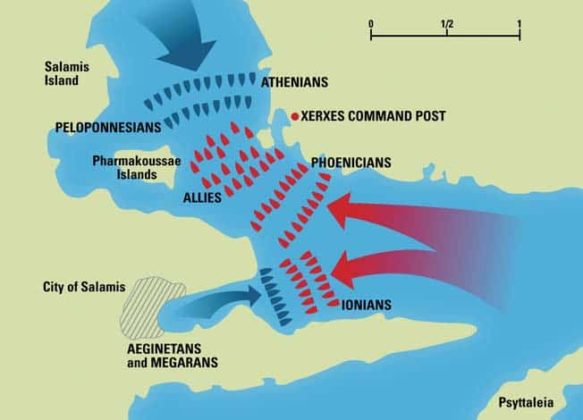What Thermopylae and Salamis Can Teach Us Today

by Endy Zemenides
When the Hellenic Republic established a special commission to celebrate the 2500th anniversaries of the Battles of Thermopylae and Salamis, no one could have foreseen the disruption caused by the Corona virus, an enemy fiercer than Xerxes’ invading Persian force in 480 B.C. This week, HALC and the Greek Embassy in Washington, DC undertook a virtual celebration of the 25th centennial of these historic battles via Facebook Live interviews with Professor Paul Cartledge of Cambridge, the author of the novel Gates of Fire Steven Pressfield, and Professor Barry Strauss of Cornell (the lectures can be still viewed on either the Embassy’s or HALC’s Facebook pages or on HALC’s YouTube channel). Despite the passage of 2500 years, Thermopylae and Salamis can inform what kind of world we build coming out of this crisis.
Pressfield’s novel, along with Cartledge’s Thermopylae: The Battle That Changed the World and Strauss’ The Battle of Salamis: The Naval Encounter That Saved Greece – and Western Civilization, are all must-reads. They present more than a “history” – they present a sort of biography of ancient Greece. Their readers feel a human connection with Leonidas, Themistocles, the Spartans, the Athenians and others. The books give us more than dates, names and facts to memorize. They invite us to delve into deep historical and philosophical human questions.
Herodotus – the “father of history” – is the reason we know the stories of these two battles. He and Thucydides – judged to be the first “modern historian” – present ancient history in such a way that they make clear it is men, not gods that make history. Students of the Persian Wars cannot help but wonder how different the results may have been if Leonidas was not one of the kings of Sparta, to imagine a victorious Xerxes had Themistocles had been ostracized by Athens instead of leading the Athenian fleet.

The Battle of Salamis
As we face a world full of fear, we should pay special attention to the way Pressfield’s Spartans confront Phobos in The Gates of Fire. In Admiral James Stavridis’ The Leader’s Bookshelf, retired General John Allen recommended the novel as “a particularly powerful book about leadership [that] perfectly illuminates the great truth of combat, which is that [men and women] fight above all for the man or woman standing next to them. One of the characters says of men in battle that ‘the opposite of fear is not courage—it is love.’”
This leadership approach has been conspicuously absent from the approach of so many “leaders”. Fear is being confronted with more fear, with nonsensical declarations that lead one to believe that the very Enlightenment is on trial. People throw out statistics to justify their willingness to let 1% of the population perish, but they do not show “love” or any type of commitment to the healthcare workers and first responders who are fighting this war and asking us to stay home.
And when the immediate public health crisis passes, fear may still be on the uptick. The brand of leadership brought to life in The Gates of Fire and celebrated by the United States military – which teaches the novel at West Point, the United States Naval Academy, and the Marine Corps’ Basic School – will be needed more than ever.
But more than anything, the COVID crisis has demonstrated the need for a modern-day Themistocles. As we despair over our lack of testing or PPE, about our health care infrastructure or what our economy will look like the day after the crisis, we should recall how Themistocles became – as Barry Strauss described to us – “the MVP of the Persian Wars”.
He urged the Athenians to build triremes – the large wooden ships that ancient Greece is now famous for. This was a significant – and expensive — change of direction for the polis, and the debate over it found itself at the heart of the struggle for leadership of Athens between Themistocles and Aristides. Themistocles ultimately prevailed, and Aristides was ostracized.
It is those triremes that held the Persians to a standstill at the Battle of Artemisium, that secured victory at Salamis, that established an Athenian empire in the Aegean that brought us the Golden Age of Pericles. What will be the 21st century triremes?
As we envision where we go from here, let’s remember Herodotus’ and Thucidydes’ lessons that men make history. And if we are going to emerge stronger and better from this crisis, we need leaders who display the love of Leonidas for his troops and his subjects and who are as visionary and strategic as Thucidydes.











0 comments